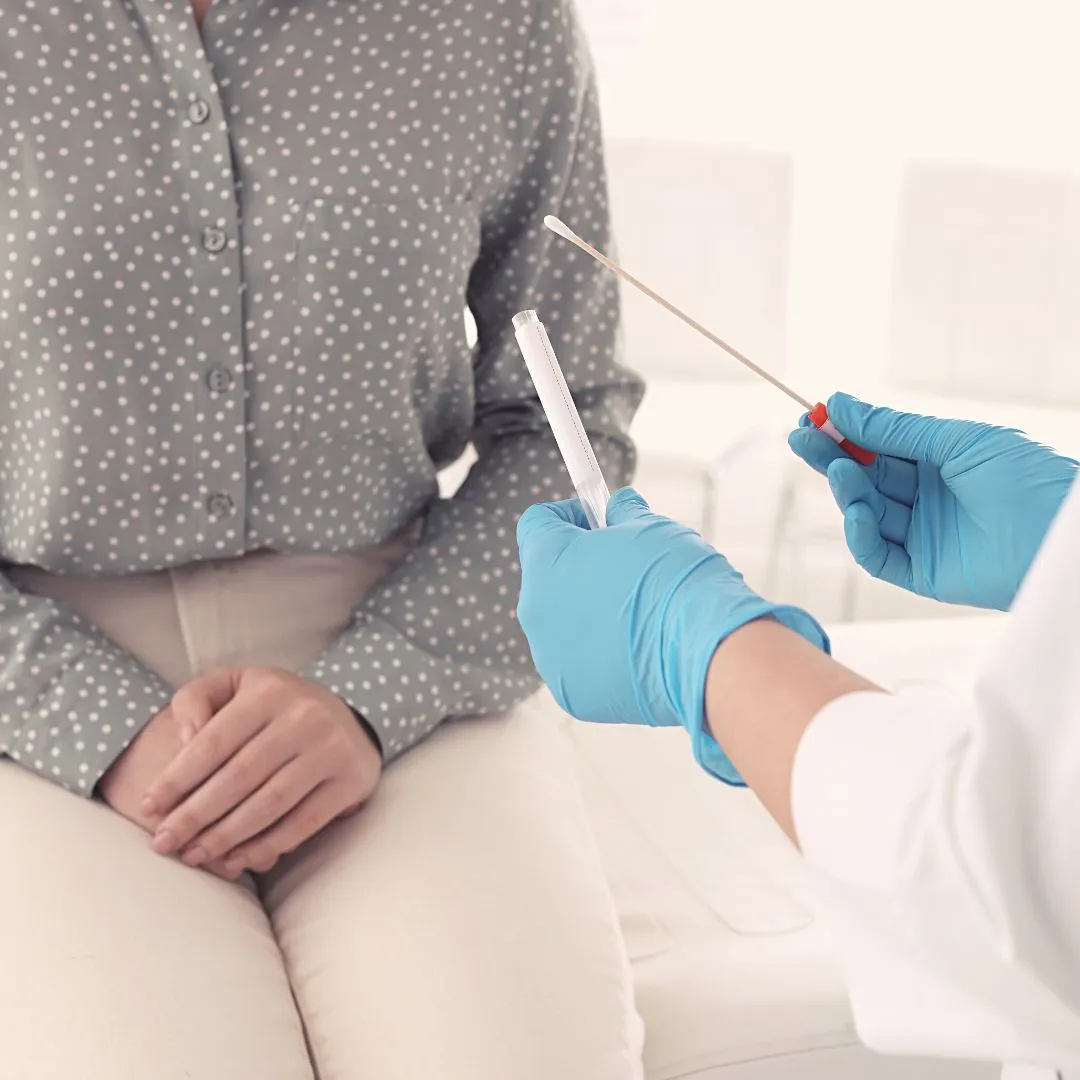Does A Pap Smear Test For Gonorrhea?
A Pap smear test, also known as a Pap test, is an essential part of routine cervical cancer screening for women. Many patients also wonder if a pap smear can test for other sexually transmitted infections like gonorrhea.
Does A Pap Smear Test For Gonorrhea: No
A pap smear does not test for gonorrhea. STD testing is not the purpose of a pap smear. But STD testing and STD screenings are very important to have done for sexually active women. Cervical cancer is caused by the human papillomavirus.
What Does A Pap Smear Test For?
A Pap smear, also known as a Pap test, is a medical procedure that involves the examination of cervical cells to detect the presence of abnormal cells and screen for cervical cancer.
HPV And Pap Smears
There is one sexually transmitted infection that is related to pap smears and cervical cancer. This is HPV, which stands for Human Papilloma Virus.
In some cases where a pap smear is abnormal, the sample of cervical cells will then be automatically sent for HPV testing (reflex testing). However, in older populations, HPV testing is often routinely done at the same time as the pap smear (co-testing).
HPV infection is responsible for causing cervical cancer. In fact, in parts of the world where the HPV vaccine is regularly administered, the rates of cervical cancer have declined.
Pap Smears And Sexually Transmitted Disease
Pap smears do not test for sexually transmitted infections or STDS. To test for these STIs, separate STI testing is required. In addition to testing for gonorrhea, you can request a test for genital herpes, HIV infection, bacterial vaginosis, and chlamydia.
Can You Ask For Gonorrhea Testing During A Pap Smear?
Yes, you can request gonorrhea testing during a Pap smear appointment. Although a Pap smear itself doesn’t test for gonorrhea, your healthcare provider can collect additional samples or perform additional testing while you are undergoing the Pap smear.
Depending on the lab that the doctors office uses, you may need to collect different samples- one of the pap smear and one for testing for gonorrhea. However, you can do them both during the same visit. It only takes a few extra seconds to do the second test.
For example, during the process of collecting a cervical sample for a Pap smear, the healthcare provider can also collect a swab sample to test for gonorrhea and chlamydia. Most swabs will check for these two sexually transmitted infections at the same time.
Keep in mind that additional STD tests should be scheduled depending on your sexual activity and risk factors, such as new sexual partners or inconsistent use of condoms. It is essential to discuss your concerns with your healthcare provider to determine the appropriate testing schedule and maintain your sexual health.
How To Detect Gonorrhea
While you are having your pap smear exam, it is a good idea to ask your doctor about testing for sexually transmitted infections. Routine screening for sexually transmitted infections in sexually active women is an important part of women’s health. HIV testing can also be added to testing for gonorrhea.
What Is Gonorrhea
Gonorrhea is a common sexually transmitted disease (STD) caused by the Neisseria gonorrhoeae bacterium. It infects both men and women and can lead to serious health complications if left untreated. Early detection and treatment are crucial in controlling the spread of this disease.
What Are The Symptoms?
Gonorrhea often exhibits no symptoms, making it difficult to detect without proper testing. When symptoms do appear, they may include pain or discomfort during urination, yellowish discharge from the genitals, and pain or swelling in the testicles for men. Women may experience abnormal vaginal bleeding, painful urination, or pelvic pain. Some women may also have pain or bleeding during sex.
How Do You Get Gonorrhea?
Gonorrhea is transmitted through unprotected sexual contact with an infected person, involving vaginal, anal, or oral sex. The risk of infection increases with the number of sexual partners and lack of barrier protection, such as condoms.
If you have a new partner, you both may want to consider getting tested for STIs before having unprotected sex. These test results can be helpful to make sure you take the proper precautions with sex partneres.
How Do You Detect Gonorrhea?
The most common tests for diagnosing gonorrhea involve collecting a urine sample or a cervical swab from the affected area. These samples are then analyzed for the presence of the N. gonorrhoeae bacterium.
A pelvic exam may be performed to inspect women’s reproductive organs for signs of infection. The gonorrhea test should be part of regular screening for sexually active individuals, especially those with high risk factors.
Gonorrhea testing is done through two main methods:
- Swab samples: A swab is used to collect samples from the vagina, cervix, urethra, anus, or throat.
- Urine tests: A sample of urine is analyzed for the presence of gonorrhea bacteria.
How Do You Treat Gonorrhea?
According to the CDC website, 1.6 million new gonorrhea infections happen each year. Unfortunately, half of those infections are resistant to at least one antibiotic.
The antibiotic treatment for gonorrhea has evolved over time due to the development of antibiotic-resistant strains of the bacteria Neisseria gonorrhoeae, which causes the infection.
The recommended treatment for gonorrhea is Ceftriaxone (a cephalosporin antibiotic) given as a single intramuscular injection.
In many cases, a patient who tests positive for gonorrhea, will also be tested and treated for chlamydia. Chlamydia treatment is typically done with oral Azithromycin.
What Happens If You Don’t Treat Gonorrhea?
If left untreated, gonorrhea can lead to serious health issues. In women, it can cause pelvic inflammatory disease (PID), which may result in infertility or ectopic pregnancies. In men, it can lead to inflammation and infertility. Furthermore, untreated gonorrhea increases the risk of contracting other common STDs, such as Chlamydia and HIV.
Practicing safe sex, maintaining open communication with sexual partners, and regularly getting tested for STDs are crucial in maintaining overall sexual health and ensuring effective disease control.
Why Are Pap Smears Important?
Pap smears are important for many reasons.
Cancer Detection
Pap smears play a crucial role in maintaining the reproductive health of women. Regular pap smears, also known as cervical smears, provide a reliable method for detecting precancerous cells and cervical abnormalities, potentially reducing the cases of cervical cancer.
During a Pap smear, the health care provider collects a small sample of cells from the outer layer of the cervix. These cells are examined under a microscope to check for abnormalities.
HPV Vaccination
HPV vaccination has been shown to significantly reduce the rates of cervical cancer in those patients who have received it. However, even if you have the HPV vaccine, it is still important to have regular pap smears to check for abnormal pre cancerous cells in the cervix.
Discussing General Women’s Health Concerns
While primarily used for detecting cervical abnormalities, Pap smears may also coincide with testing for sexually transmitted diseases (STDs). For example, a health care provider may use the same sample collected during a Pap smear to further test for the presence of STDs, thus providing additional insights into the patient’s reproductive health. Chlamydia and gonorrhea are commonly tested for during this time1.
However, a Pap smear does not test for human immunodeficiency virus (HIV). An HIV test typically requires a blood sample.
This appointment also gives you the opportunity to discuss any other concerns you may have. If you want access to birth control pills or you have questions about vaginal discharge, this appointment is the best way to also ask questions to your doctor.
An important aspect of Pap smears is the communication of results. Normal Pap smear results often mean no further action is needed until the next scheduled test. Abnormal results, on the other hand, might require a follow-up by the health care provider. A positive result for an STD, like gonorrhea, signifies the need for immediate treatment to prevent complications.
Does A Pap Smear Test For Gonorrhea: Summary
Gonorrhea is a common STI that affects both men and women, and can have serious implications on a person’s reproductive health if not treated in its early stages. While a Pap smear test is not designed to diagnose gonorrhea directly, additional tests for common STDs can be done during this visit. Depending on a person’s sexual history and sexual behaviors they may be at a higher risk than the general population for certain sexually transmitted infections.
While pap smears do not test for sexually transmitted infections, abnormalities in your cervical smear may be caused by certain strains of HPV, which is an STD. The only way to know if HPV is causing harmful changes if by having regular testing for cervical cancer with a pap smear. If you have an abnormal pap smear result, the doctor may then also send for HPV testing and other further testing.








